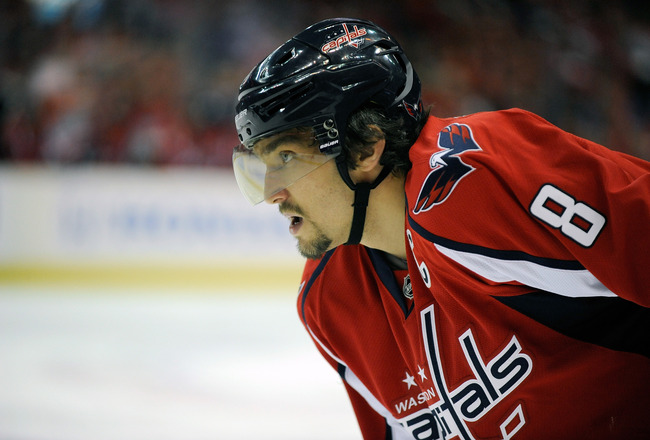
The NHL lockout (2012 edition) is now threatening to more or less dismember the league entirely, and while we could argue about which side is to blame for the impending loss of another season, there is one fact that is clear: high-end, superstar contracts are responsible for causing this labor stoppage in the first place. I can just imagine general managers and team owners sitting in the dark corner of their offices as free agency looms, twitching like junkies-in-waiting to throw money at players like Alexander Ovechkin and Zach Parise. They just can't help themselves. Never mind the long-term repercussions of inking superstars to contracts that could very well out-survive team management, coaches, and nearly every other player on the team. Or the fact that signing players to $100 million contracts may not be good for business. And, as it turns out, it hasn't been good for business. Because suddenly the owners don't have the money to honor the deals they gave to players like Ryan Suter, Marian Hossa or Dan Briere. Suddenly they are so strapped for cash that they are willing to lose another entire season of professional hockey, and perhaps even kill the league itself, to get out of the contracts they agreed to in good faith. Make no mistake about it: This labor dispute isn't about the everyman hockey player. This isn't about Dan Cleary or Andrew Brunette. This isn't about Martin Biron or Brian Boucher, the muckers and the grinders and the guys that lay down in front of shot after shot during their 7 minutes of game time. The lockout is about the superstars, and the obsessed, clueless owners that don't have the sense not to sabotage themselves and poison the game with their greed and selfishness. I don't blame the players for signing long-term, lucrative deals. But at the same time, I don't see Brad Richards and Marty St. Louis fighting tooth and nail to raise the minimum contract floor for the guys on the third and fourth lines. I see them fighting to keep their own ridiculous deals.
Henrik Zetterberg
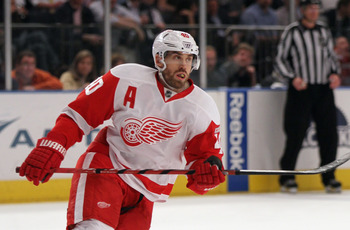
Ilya Kovalchuk
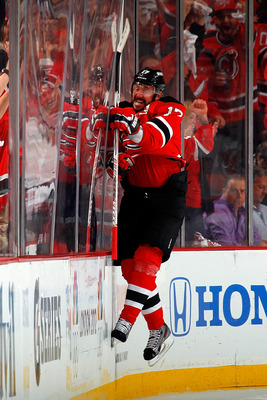
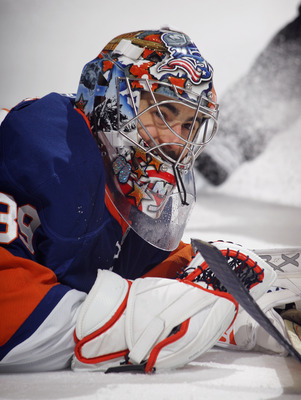
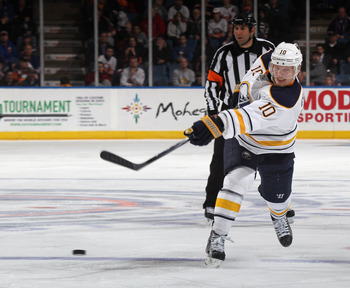
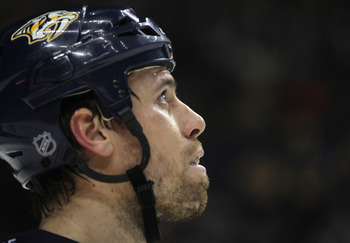
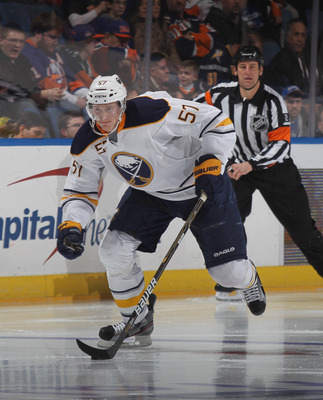
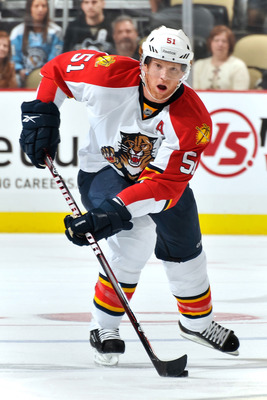
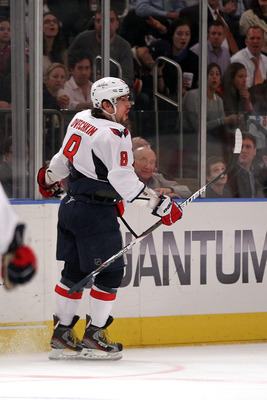
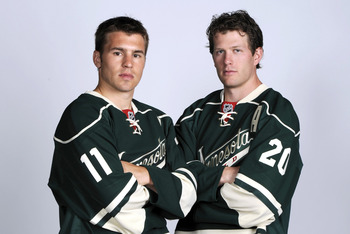
Henrik Zetterberg

One could argue that Detroit Red Wings GM Ken Holland invented the "back diving" deals that the NHL is now ferociously trying to choke out of existence—and one of the first players inked to such a deal was Henrik Zetterberg. After Zetterberg makes between $7 million and $7.5 million throughout the first nine years of his contract, the number plunges to a little over $3 million for the 2018-19 season and sinks all the way to $1 million for the last two years of the deal, thus lowering Zetterberg's cap hit significantly. His contract isn't the most egregious deal in the sport, but it was among the first to create a mechanism that is now causing the NHL to lockout its players.
Ilya Kovalchuk

Ilya Kovalchuck is the original $100 million dollar man himself. Taking one look at the structure of this deal tells you everything you need to know about why it is among the worst offenders in the league, and why Lou Lamoriello is among the craftiest GMs in hockey. Fans will recall the circus that surrounded this deal because it is the highest profile deal the NHL called into question Pundits such as myself saw this as a too-little, too-late move by the league to curtail back-diving deals, and we are living in lockout land now because of these kinds of contracts. The 15-year pact is still tied for second-longest in the league. The deal will end in 2024-2025. That year will be the first that I'd be eligible to run for President of the United States, just to put that length of time in perspective.
Rick DiPietro
Rick DiPietro and his contract are too easy of a target for jokes in my honest opinion. The 15-year deal the New York Islanders handed DiPietro was groundbreaking at the time, but has become the classic long-term contract cautionary tale that exactly none of the NHL's 30 GMs have paid any attention to. It's not noteworthy because the Isles are stuck paying a man that seems to be made of glass and bad luck $4.5 million dollars per season. That cap hit isn't too bad, I guess. But the 15-year exclamation mark seemed to get all the other GMs thinking about locking down their assets for decades and decades at a time.
Christian Ehrhoff
The deal that the Buffalo Sabres handed to Christian Ehrhoff is one of the finest examples of a team just not being able to control itself. Remember the junkie from the first slide? The one that just couldn't help but throw money around towards the substance that is a star player? That's Darcy Regier and Terry Pegula. Coming off of two rock solid seasons with the Vancouver Canucks, everyone knew that Ehrhoff was poised for a big payday, but no one thought it would be to the tune of $40 million over ten years. This is another long-term deal that was front loaded with a massive signing bonus—another head on the hydra that has consumed 90-plus days of the 2012 NHL season. Ehrhoff's deal is among the longest in the league, and his $5 million dollar signing bonus is good for sixth largest in the NHL.
Shea Weber
The Shea Weber offer sheet was among the most tone-deaf and ignorant ploys I have ever seen in the sport. With the league spiraling towards a lockout and various team owners piping up about how they just couldn't survive in a climate where the players make this much money, the Philadelphia Flyers signed Shea Weber to an offer sheet worth $14 million dollars a year over the span of 14 years. The kicker of course was the highly publicized $13 million signing bonus attached to the deal. I understand the logic of why Flyers GM Paul Holmgren would make a grab for an anchor like Weber. All-Star blueliners don't grow on trees, and the Flyers defense was falling apart at the seems through injuries and departures. But the deal literally represents everything that the owners are now trying to combat just a few months later. It's all there. Back diving, a massive signing bonus, and a ridiculous contract length. Some owners have a right to argue that players are making too much money and that less profitable clubs just can't hang. Paul Holmgren isn't one of them.
Tyler Myers
After Tyler Myers' three-year entry-level contract was up in 2011-12, the Buffalo Sabres handed the towering defender a signing bonus of $10 million dollars. That bonus makes Myers (tied for) the third highest salary in the NHL. Protecting your assets is one thing. Giving a kid that much money after a few good seasons is a bit on the insane side, and this is yet another example of owners and GMs not being able to control themselves when it comes to signing these types of players.
Brian Campbell
A lot of fans have forgotten, but there was a point when the Chicago Blackhawks had to (vastly) overpay players to lure them to the Windy City. The eight-year, $57 million dollar deal the Hawks handed to Brian Campbell may seem like small potatoes now—a good indicator of the direction salaries have taken over the course of the now-defunct CBA—but at the time of the deal it made Campbell one of the richest players in hockey. There are a few times I can remember pulling up NHL.com during free agency and having my jaw drop over a ridiculous number or term. Campbell was the first and it signaled a particular direction for the entire league. Owners and GMs both saw these contracts being handed out and knew that they'd either have to up the ante or be left behind.
Alex Ovechkin
I was (and admittedly still am) on the fence about including Alexander Ovechkin's contract among those that helped usher in this lockout. On the one hand, the Washington Capitals constructed a fair deal for their All-Star. There is no back diving on the contract and no massive signing bonus to speak of. At the same time, I feel like I'd be remiss if I left out the player with the largest total cap hit in the NHL when counting up the most destructive contracts around. I appreciate the fact that the Capitals seemingly negotiated in good faith with Ovie and also negotiated with the "spirit" of the CBA in mind. At the end of the day though, the Great 8 still will make close to $10 million dollars a season for 13 years, and it's those kinds of deals that have allegedly stripped owners of their ability to make enough profit from owning a pro-hockey franchise.
Zach Parise & Ryan Suter
"We're not making money, and that's one reason we need to fix our system. We need to fix how much we're spending right now. [The Wild's] revenues are fine. We're down a little bit in attendance, but we're up in sponsorships, we're up in TV revenue. And so the revenue that we're generating is not the issue as much as our expenses. And [the Wild's] biggest expense by far is player salaries."
This now infamous quote came from Minnesota Wild owner Craig Leopold while talking to the Star Tribune on April 11th, 2012. Or roughly three months before he went out and spent nearly $100 million dollars on two players mere months before the lockout began. I'm not the first person to point out the asinine level of hypocrisy in play here. Needless to say, the Wild can go on to win four Stanley Cups over the matching 13-year deals, but Zach Parise and Ryan Suter will always be burned into the minds of fans as the poster boys of a failed CBA structure and a bleaker-than-bleak lockout.
This now infamous quote came from Minnesota Wild owner Craig Leopold while talking to the Star Tribune on April 11th, 2012. Or roughly three months before he went out and spent nearly $100 million dollars on two players mere months before the lockout began. I'm not the first person to point out the asinine level of hypocrisy in play here. Needless to say, the Wild can go on to win four Stanley Cups over the matching 13-year deals, but Zach Parise and Ryan Suter will always be burned into the minds of fans as the poster boys of a failed CBA structure and a bleaker-than-bleak lockout.
No comments:
Post a Comment